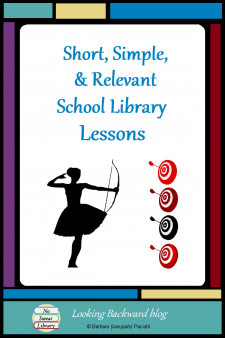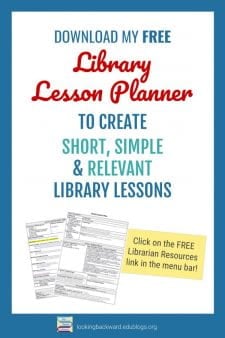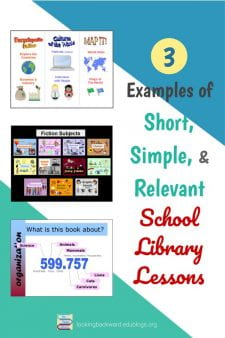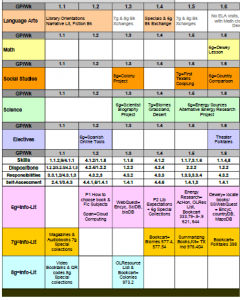 Putting student needs first means we don’t throw everything at them, all at once. It means we teach only the information or skill students need for the short time they are in front of us—and that is a very different perspective. What students deserve from School Librarians are short, simple lessons that support classroom learning and inculcate the multiple literacies important in our global society.
Putting student needs first means we don’t throw everything at them, all at once. It means we teach only the information or skill students need for the short time they are in front of us—and that is a very different perspective. What students deserve from School Librarians are short, simple lessons that support classroom learning and inculcate the multiple literacies important in our global society.
I regard library materials as accessories for Library Lessons. If books and electronic devices were the most important part of the library, they wouldn’t need us at all. Yes, there are those in school districts, in the business community, and in the political arena who think just that, but School Librarians know that even if the library and everything in it burns down, we can still teach kids what they need for their future success, better than any physical materials ever can. So let’s focus on creating meaningful Library Lessons that students need.
HOW TO PLAN FOR LIBRARY LESSONS
Our biggest adjustment from classroom to library is that we won’t see students day after day for lessons; most of the time we have a single class period to influence and inspire their learning. The key to a quality Library Lesson is to support what students are studying in the classroom and avoid anything that does not achieve the purpose of the library visit. Our Library Lessons need to build on classroom experiences, otherwise, it’s all meaningless to the student and quickly forgotten.
Most kids, of any age, remember something they do better than something they’re told, so our Library Lessons need to focus on a single objective and have a meaningful activity so students can practice what they learn. We need to know every teacher’s curriculum—not the depth, but the breadth of all subject curricula through all grade levels—so we can determine when teachers are likely to bring classes to the library, what students are studying that brings them to the library, and what they need to know about the library to do what the teacher expects them to do.
To keep track of lessons, I created a visual guide: my “Library Curriculum Matrix.” I examined subject area curriculum guides for classroom assignments that would need library visits or materials, then entered the name and time span for those units on my Matrix. Once complete I can plan short lessons to progressively build Information Literacy skills for each grade level throughout the school year. My matrix changes as standards and course curricula change, and I can maintain a broad view of Info-Lit visits to (and collection needs for) my middle school library. It’s also pretty impressive to teachers when I pull it up for scheduling their library visit—they really see what a School Librarian’s job is all about!
 I learned pretty quickly that if I want the principal and teachers to regard me as a teaching professional, I need to have a formal lesson plan for my Library Lessons. I combined the best parts of other lesson planners into my own Library Lesson Planner. By starting with subject area content standards, I can integrate library standards and keep the purpose of the library visit clearly in mind throughout the planning process.
I learned pretty quickly that if I want the principal and teachers to regard me as a teaching professional, I need to have a formal lesson plan for my Library Lessons. I combined the best parts of other lesson planners into my own Library Lesson Planner. By starting with subject area content standards, I can integrate library standards and keep the purpose of the library visit clearly in mind throughout the planning process.
Download my Library Lesson Planner as a .docx or a .PDF from my Free Librarian Resources page.
INTEGRATING & SIMPLIFYING IS OUR SPECIALTY
I’ve always tried to see the big picture, and my Library Curriculum Matrix and my Library Lesson Planner allow me to do that. At the same time, they allow me to take a complex concept or process and simplify it. These two planning documents have helped me create successful and meaningful lessons for students as a School Librarian for grades 6-8.
Here are some of my tips to create a good Library Lesson:
- Customize lessons for the age of your students; what works for 6g may not work with 7g and definitely won’t work with 8g.
- Teach only what students need to perform the task at hand; if they won’t need it, don’t mention it. Less is better!
- Limit slide presentations to 10-12 slides with only one bit of content per slide. Use illustrative graphics, whether images, charts, or examples, to provide anticipation for what you’ll say.
- Use lots of infographics and graphic organizers rather than textual worksheets. Save the reading for the books!
- Model with students what you want them to do. Seeing is not only believing, it is learning!
- Always give students a chance to move around sometime during the class period.
 One example of how I keep a lesson simple and relevant is teaching students the different type of stories in the Fiction section. The first time I tried teaching adventure, mystery, etc. as “genres“, the kids were completely confused because they’d been learning in their ELA class that genres are types of literature: narrative, expository, drama, poetry. I quickly changed the term to Fiction “Subjects” and they readily understood—they already associated Subject with Dewey books and with an OPAC Book Search by Subject for the kind of story they want to read.
One example of how I keep a lesson simple and relevant is teaching students the different type of stories in the Fiction section. The first time I tried teaching adventure, mystery, etc. as “genres“, the kids were completely confused because they’d been learning in their ELA class that genres are types of literature: narrative, expository, drama, poetry. I quickly changed the term to Fiction “Subjects” and they readily understood—they already associated Subject with Dewey books and with an OPAC Book Search by Subject for the kind of story they want to read.
An example of a short and relevant lesson is introducing Dewey books with 6g & 7g Math classes so they can practice decimals at the start of their unit. Since all students really need to know is how to locate a number on a shelf, that’s what my lessons do. The teachers love it because it’s more fun than a review test, yet they can fully interact with students during the lesson to see who might need extra help.
I also keep it short, simple, and relevant by using a WebQuest to introduce online subscription services. I pick one of our online encyclopedias and 1 or 2 other services that support the classroom activity, and students learn to use 1 or 2 different features from each one to complete their assignment. Teachers love my WebQuests—they are customized for their unit and give students quality online information sources without time-wasting Internet searches.
SHORT, SIMPLE, AND RELEVANT PRIORITIZES STUDENTS
I discovered that by keeping students and Library Lessons as the priority, and treating the school library as just a bigger classroom with a lot more stuff, everything else about the library falls into place: collection development, facility organization, library scheduling, library advocacy, and even professional development. Simplifying my Library Lessons helped me simplify managing my School Library, and I’m sure it will help you do the same.




Indeed it is helpful for the Librarians.
Thank you.This is very helpful.
Holy cow! I’m really learning a lot on your blog. Thank you for all of the time and intelligent ideas you have put into your site.
Thank you, Frank, for your kind comment. I’m glad to hear my knowledge & experience are helpful. And thanks for subscribing!
BrP
Thanks! This reminds me to keep it simple! I love your lesson plans, thanks for sharing them!